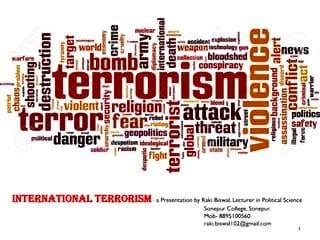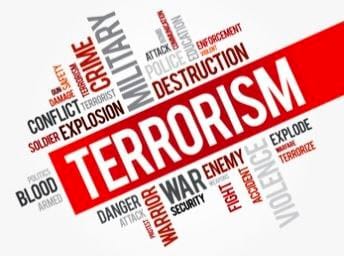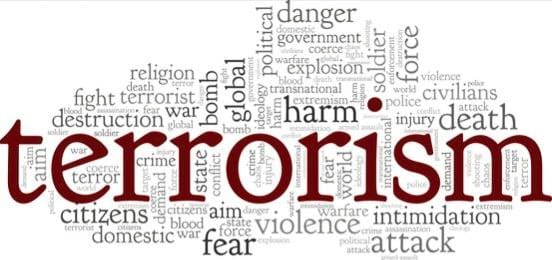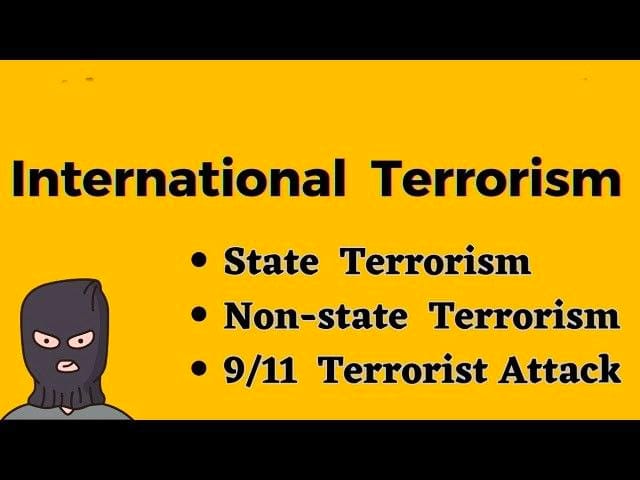International Terrorism : Non-State Actors and State Actors
International terrorism refers to violent acts committed by individuals or groups (both state and non-state actors) that cross national borders with the intention to create fear, achieve political goals, or coerce governments and societies. This form of terrorism targets civilians, governments, and institutions and has a global impact. Terrorist activities can be carried out by non-state actors (independent organizations or individuals) or state actors (governments or state-sponsored groups).
1. Meaning of International Terrorism:

International terrorism involves:
- Violent acts motivated by political, religious, ideological, or social objectives.
- Cross-border actions or influence, impacting more than one country or involving foreign actors.
- Terrorist organizations or networks that operate across multiple countries or receive support from external sources.
It can include bombings, hijackings, cyberattacks, assassinations, and the use of weapons of mass destruction.
2. Non-State Actors in International Terrorism:

Non-state actors are groups or individuals that engage in terrorism without direct affiliation with any state government. They operate independently but may seek to influence, challenge, or overthrow existing political structures, both within their home countries and internationally.
Characteristics of Non-State Terrorist Actors:
- Independent Organizations:
- These groups are not officially affiliated with any government and often operate as insurgent or extremist groups. They typically pursue their own ideological or religious objectives.
- Example: Al-Qaeda, ISIS, and Boko Haram.
- Cross-Border Networks:
- Non-state terrorist groups often have extensive international networks, allowing them to coordinate activities, recruit members, and secure funding globally.
- Example: Al-Qaeda has cells across several continents, and ISIS utilized social media to recruit globally.
- Asymmetrical Warfare:
- These groups use unconventional tactics, such as suicide bombings, kidnappings, and cyberattacks, to challenge states that have more significant military power. Their goal is to create fear, weaken governments, or gain international attention.
- Funding and Resources:
- Non-state actors rely on various sources for funding, including donations, smuggling, drug trafficking, extortion, and sometimes support from sympathetic foreign actors or governments.
- Example: ISIS generated revenue through oil smuggling and extortion in the areas it controlled.
- Ideological and Religious Motivations:
- Many non-state actors are motivated by religious extremism, nationalism, separatism, or ideological radicalism.
- Example: Al-Qaeda’s actions are driven by a radical interpretation of Islam, and the FARC in Colombia was driven by Marxist-Leninist ideology.
Examples of Prominent Non-State Terrorist Actors:
- Al-Qaeda:
- A global militant Islamist organization founded by Osama bin Laden, responsible for the 9/11 attacks in the U.S. Al-Qaeda aims to establish a global caliphate and has conducted terrorist operations in various countries.
- ISIS (Islamic State of Iraq and Syria):
- A terrorist organization that established a self-proclaimed “caliphate” in Iraq and Syria, known for its brutality, including beheadings, kidnappings, and attacks on civilians worldwide.
- Boko Haram:
- A Nigerian Islamist group known for kidnapping schoolgirls and attacking civilians, with an ideology opposing Western education and promoting extremist religious views.
- Lashkar-e-Taiba (LeT):
- A Pakistan-based militant group responsible for the 2008 Mumbai attacks in India. It seeks to overthrow Indian rule in Kashmir and has international terrorist ties.
3. State Actors in International Terrorism:

State actors in terrorism refer to governments or governmental entities that engage in, sponsor, or support terrorist activities. State sponsorship of terrorism involves governments providing material, financial, logistical, or operational support to non-state actors or carrying out acts of terrorism themselves.
Characteristics of State-Sponsored Terrorism:
- Direct Involvement:
- Some governments may directly engage in terrorist acts by targeting foreign governments, dissidents, or civilian populations through secretive operations or covert forces (such as intelligence agencies).
- Example: The Syrian government has been accused of using chemical weapons on civilian populations.
- Support for Terrorist Groups:
- States may provide financial support, weapons, safe havens, or training to terrorist groups that align with their foreign policy or strategic objectives.
- Example: Iran is widely believed to sponsor Hezbollah and other Shiite militias in the Middle East to advance its regional influence.
- Proxy Warfare:
- States use terrorist organizations or militias as proxies to conduct attacks on foreign governments or interests without direct involvement, thus maintaining deniability.
- Example: Iran’s support for Hezbollah in Lebanon or the Houthi rebels in Yemen is seen as a form of proxy warfare against Israel and Saudi Arabia.
- Political and Strategic Goals:
- Governments may engage in or support terrorism to weaken rival states, destabilize regions, or achieve geopolitical goals while avoiding direct military confrontation.
- Example: The Libyan government under Muammar Gaddafi was implicated in the 1988 Lockerbie bombing.
- Denial and Diplomatic Cover:
- States engaging in or supporting terrorism often deny their involvement and provide diplomatic cover for terrorist organizations, protecting them from international sanctions or military retaliation.
- Example: Pakistan has been accused of covertly supporting militant groups like the Taliban while denying direct involvement.
Examples of State-Sponsored Terrorism:
- Iran:
- Iran has been accused of supporting various militant groups across the Middle East, including Hezbollah, Hamas, and Shiite militias in Iraq and Syria, using these groups to further its influence in the region and challenge U.S. and Israeli interests.
- North Korea:
- North Korea has been implicated in several acts of terrorism, including the bombing of a South Korean airliner in 1987. It has also been accused of supporting terrorist groups and using terrorism as a tool of state policy.
- Syria:
- The Syrian government, particularly under Bashar al-Assad, has been accused of state terrorism through its use of chemical weapons against civilians during the ongoing Syrian Civil War.
- Pakistan:
- Pakistan has faced allegations of providing support and safe havens to terrorist groups like the Taliban, Haqqani Network, and Lashkar-e-Taiba, particularly in its strategy regarding Afghanistan and Kashmir.
4. Interaction Between Non-State and State Actors:
Non-state actors and state actors often have a symbiotic relationship when it comes to international terrorism. States may use non-state actors as proxies to pursue their foreign policy objectives without engaging in direct military conflict. Non-state actors, in turn, benefit from the financial, logistical, and political support provided by states.
Examples of Interaction:
- Iran and Hezbollah: Iran provides Hezbollah with funding, arms, and training. In return, Hezbollah acts as a proxy for Iranian interests in Lebanon and against Israel.
- Pakistan and the Taliban: Pakistan has been accused of covertly supporting the Taliban in Afghanistan to counter Indian influence and maintain a friendly regime in Kabul.
5. Control Measures for International Terrorism:
Efforts to combat international terrorism require a multi-pronged approach involving diplomacy, intelligence, military action, and legal frameworks.
International Cooperation:
- Countries collaborate through international organizations like the United Nations (UN), Interpol, and regional alliances (e.g., NATO) to combat terrorism globally.
- Example: The UN Security Council Resolution 1373 (adopted after 9/11) requires member states to prevent and criminalize terrorism financing and cooperate in the fight against terrorism.
Counterterrorism Measures:
- Military Action:
- Military interventions are sometimes used to target terrorist strongholds or eliminate terrorist leaders.
- Example: The U.S. military operations in Afghanistan after 9/11 targeted Al-Qaeda and the Taliban.
- Sanctions and Financial Controls:
- The international community can impose sanctions on states sponsoring terrorism and freeze the assets of terrorist organizations to cut off their funding.
- Example: The U.S. and UN sanctions against Iran for supporting terrorist groups.
- Intelligence Sharing:
- Nations share intelligence on terrorist activities, networks, and financing to preempt attacks and disrupt operations.
- Example: The Five Eyes Alliance (U.S., U.K., Canada, Australia, and New Zealand) is a key intelligence-sharing network for counterterrorism.
- Diplomatic Pressure and Isolation:
- Countries supporting terrorism may face diplomatic isolation and international pressure through sanctions, trade restrictions, or military deterrence.
- Example: Diplomatic efforts to pressure North Korea to cease its support for terrorism.
- Legal and Judicial Measures:
- International law and domestic laws criminalize terrorist activities, financing, and support. Legal frameworks are essential in prosecuting terrorists and their sponsors.
- Example: The International Criminal Court (ICC) prosecutes individuals responsible for crimes against humanity, which can include acts of terrorism.
Conclusion:
International terrorism presents a complex and evolving threat to global security, involving both non-state actors and state actors. While non-state actors like Al-Qaeda and ISIS operate independently to achieve their ideological goals, state actors can play a significant role in sponsoring or facilitating terrorism to advance their geopolitical objectives. Combating terrorism requires international cooperation, intelligence sharing, military action, and diplomatic engagement to address the root causes and dismantle terrorist networks.

